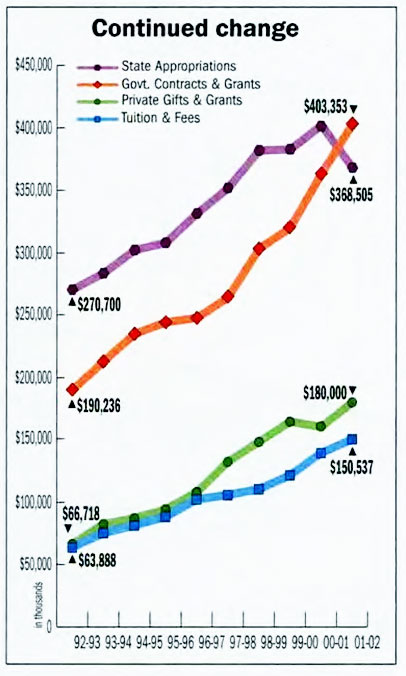Seizing an Opportunity
Posted on Jan. 13, 2003

Douglas S. Dibbert ’70
A few years ago, when speaking to a national gathering of alumni directors, the then-chancellor of the University of Wisconsin, David Ward, asserted that world-class research universities would be in fierce competition in the early part of the 21st century and that ultimately only two dozen — at most — would remain. In making his prediction, Ward cited dramatically escalating costs of research equipment and talent needed, particularly in the sciences. Ward, who is now president of the American Council on Education, expressed concern that only a few of those two dozen institutions would be U.S. universities.
We should ask: Will Carolina continue to thrive among the best research institutions anywhere? And why should we care?
 The accompanying chart shows that for the first time at UNC, the total funds received from state appropriations has fallen below those generated by faculty research. Further, the average annual growth rate from fiscal 1989-90 through 2001 -02 in state appropriations (3.3 percent) was roughly one-third of that from tuition and fees (10.3 percent), private giving (10.8 percent) and research grants and contracts (9.8 percent).
The accompanying chart shows that for the first time at UNC, the total funds received from state appropriations has fallen below those generated by faculty research. Further, the average annual growth rate from fiscal 1989-90 through 2001 -02 in state appropriations (3.3 percent) was roughly one-third of that from tuition and fees (10.3 percent), private giving (10.8 percent) and research grants and contracts (9.8 percent).
Despite difficult economic times, North Carolina taxpayers remain among the nation’s most generous in supporting public higher education. Not only does such support reflect North Carolina’s long commitment to our University, it also is an acknowledgment that Carolina remains a vital engine for the economic well-being of all North Carolinians. Carolina’s generous $500 million share of the higher education bond package, which was overwhelmingly approved by the voters in 2000, testifies to the strong public support UNC has earned. These funds and growing private support from alumni and friends are being invested to expand our research capacity, which in turn creates jobs for North Carolinians, economic development in communities across North Carolina, and important discoveries that address many of society’s most challenging problems.
Important to maintaining Carolina’s research capacity are the overhead receipts, also known as facilities and administrative costs, that accompany the grant or contract awarded to the faculty members for the work that is being done for the foundation, corporation or government agency providing the funds. These funds are intended to cover the indirect costs of the work — workspace, utilities, support staff and similar expenses. (For a more thorough description of the importance of overhead receipts, please read Tar Heel Network Chair Tom Lambeth’s ’57 column on pages 66 and 67 of the November/December 2001 issue of the Carolina Alumni Review and my column on page 112 of the May/June 2002 issue.)
With 52 new members of the N.C General Assembly (16 in the 50-member Senate and 36 in the 120-member House), Carolina alumni have another opportunity to emphasize how important these funds are to our campus and to North Carolina’s economy. It will be tempting for some legislators again to attempt to use some of these funds to address the continuing state budget crisis. If they were to succeed, this would be akin to eating one’s seed corn. Some faculty would likely leave, taking their research grants with them, while other distinguished faculty would be reluctant to relocate to UNC.
If our University is to remain one of the few truly distinguished research universities, then we must retain and grow the resources available for such scholarship. Preserving and responsibly reinvesting our overhead receipts is critical, and Carolina alumni must seize the opportunities to maintain the value of our diplomas and enhance our institution’s contributions to the economic and social well-being of
all North Carolinians.
Yours at Carolina,

Douglas S. Dibbert ’70
